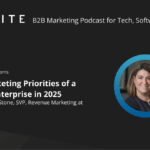Ashley Gatehouse is Chief Marketing Officer at QUANTIQ. On this episode of the FINITE podcast our host Alex Price sits down with Ashley to hear about his experiences navigating the C-Suite as a marketer.
This episode covers:
- Ashley’s marketing career, how he became a CMO, and the structure of the marketing team at QUANTIQ
- The importance of having marketing representation on a board
- How to translate marketing language for the C-suite?
- The required skill-set of a CMO and how hands on one must be in working with data
- The importance of financial training, as a marketer, to understand a CFO’s language
- What to do when a board does not see value in investing in marketing
- What is a Chief Revenue Officer and how has the role has stemmed from marketing?
- Understanding the different challenges of the sales and marketing funnels to create coordination across the teams
Listen to the full podcast here:
And once you’re done listening, find more of our B2B marketing podcasts here!
Full Transcript
Alex (00:07):
Hello everyone and welcome back to another FINITE podcast episode. Our episode today is with Ashley Gatehouse. Ashley is the Chief Marketing Officer of QUANTIQ who are a Microsoft dynamics partner. Ashley has a heck of a lot of B2B tech marketing experience across a number of different businesses, but originally trained as a direct marketer and has worked in B2C and B2B, and he’s got some fantastic insights on our topic today, which is going to be diving into how do you create the right C-suite environment for strategic marketing success? I think this is a fascinating topic. One that regardless of your level of seniority or experience as a marketer, it’s probably on everybody’s radar. So I hope you enjoy it.
FINITE (00:48):
The FINITE community and podcast, are kindly supported by 93x, the digital agency working exclusively with ambitious fast growth B2B technology companies. Visit 93x.agency to find out about how they partner with marketing team and B2B technology companies to drive digital growth.
Alex (01:10):
Hi, Ashley, thanks for joining me today.
Ashley (01:12):
You’re very welcome. Great to be with you, Alex.
Alex (01:14):
I’m looking forward to talking. I think this is a topic that everybody will relate to in terms of the C-suite environment, regardless of their role and their marketing sphere. And as we always do, it’d be good to kick off with a bit of an introduction, hear about your background and experience today and your journey to current CMO role.
About Ashley
Ashley (01:32):
Sure. Well Alex, I’m of an age where looking back, I can take you on quite a long journey. So I’ll try to abbreviate it in the interest of not boring your listeners. So I guess, my marketing journey, I trained as a direct marketer way back in the 1980s. So this was, for those who are of a younger nature, that was before the internet existed, and direct marketing back then was done through lots of traditional channels, a lot of mail order, a lot of call centre, lots of tech now that would, that would appear, you know, very Heath Robinson to a modern younger marketeer, but that’s kind of where I grew up.
Therefore, things like attribution and response management, all those kind of more, somewhat more technical things were always core to the things that I felt were important from a marketing perspective, marketing excellence perspective.
And over the years, I’ve worked in many different types of organisations. I’ve worked both B2C, B2B I’ve worked for a London venture capital firm managing the portfolio of what they would have called direct sell distance selling organisations, and a lot in between. I’ve served on many boards of different configurations.
And I guess some of the topics that we’ll talk about today are really kind of a consolidation of learnings, and I guess my core experience, if you want to call it that, that’s maybe where we could share. Perhaps it may be a little bit helpful to bring things up to date.
I’ve spent the last 14 years or thereabouts working in the tech space, which I absolutely love. I think as marketeers, we always want to be at the centre of stuff that really makes a difference and with great stories and preferably things that are moving at a fast pace and the tech space certainly does that. And I’ve absolutely loved it. I suppose, the two most relevant roles in that space has been, I was VP marketing for an organisation called Insight who are Microsoft’s largest global reselling partner, many billions of dollars. I led the marketing function for that organisation.
And I guess after that, I was global CMO for again, another large top 10 Microsoft global partner called Prayon Group. And I served on the global leadership team that took that business public about three years ago. So that was a very rewarding experience, both professionally and personally. And it did give me some flexibility in terms of what I wanted to do next.
And for me, if I just dwell slightly on the text based, the thing that is empowering organisations at the moment is that whole notion of digital transformation. I’m sure you’ve heard of it, but the modernisation of technology and how it is changing the way that we, that we manage the relationships with various stakeholders, clients, partners, teammates, and so forth within the organisation, marketing people would probably refer to that as kind of like the CRM environment and how you’re able to completely reconfigure critical organisational workflow. Which is the traditional ERP space for within the Microsoft environment, which is, I guess, where I’ve particularly got my expertise, that’s the dynamics technology stack.
So joining the dynamics consulting business like contact, which is where I’m at now, I’m seeing over QUANTIQ and sitting on the board of that organisation. That was a no brainer. And that’s where I’ve been for the last couple of years. So hopefully that was a reasonably concise introduction. If that helps.
Alex (05:23):
It was, it was great. And tell us a bit about the structure now of the marketing team and what the marketing operation looks like at QUANTIQ.
Marketing at QUANTIQ
Ashley (05:31):
It’s, I would say, relatively straightforward. You know, we spend a lot of our time on the digital marketing functions. We’re currently in the process of moving to a video led content marketing strategy. So, we have in house video capability, we spend a lot of the time focusing on the skills that we need to create compelling storytelling effectively through video. And we have quite a substantial social media operation.
We’ve just been accredited as one of Europe’s top 10 social media marketing engagement organisations for July, which is great. And we do an awful lot of outreach to clients through those digital platforms and through that type of storytelling.
So we’ve got those capabilities largely in house, and we create an awful lot of content for our sellers, and for our customers. So we work very closely with Microsoft. So we’ve got quite a big content production capability, and of course, we’ve got the technical resources in house in terms of managing those platforms.
So, I guess I’ve described an operation that is largely in house and less reliant on third party agencies. And that’s partly due to how we fund their operation. And partly due to, I guess, my personal preferences, where I like the technical skills to be under in house governance. I don’t necessarily say that you can’t do that with agencies.
There are many fantastic agencies with really smart people in them, but to leverage those on an ongoing basis, you can find it difficult to do if you’re not one of the very large brands, because to get those skill sets, those typically are the more expensive within the agency. And it’s great being with a great agency, but you need to be with the great people in that agency to drive that value. And doing that with a more modest budget is more problematic. So my view is if you can’t do that, then you need to look at trying to bring those skills, or at least the most important ones, in house. That’s kind of how we’re structured at the moment.
Alex (08:01):
Cool. Makes sense. So let’s dive into the topic. We’re going to talk about the right C-suite environment for what you described as strategic marketing success. I think this is, as I said at the start, something that everybody can relate to, you had upper team, which is often referred to as the colouring-in department in jest by some. All the stereotypes are out there. We’ve all heard the jokes.
Ashley (08:22):
Sticky back plastic and fuzzy filled.
Alex (08:24):
Exactly. Yeah. And this wasn’t, I mean, this wasn’t where I was going to start, but now you mentioned in terms of sitting on the board at QUANTIQ now, I guess the CMO role doesn’t necessarily always exist at a kind of board level in a lot of organisations still, obviously we’ll dive into the dynamics of how everything works for you a bit more at the moment, and your past experiences, but do you think sitting on the board is a requirement if marketing is going to be taken seriously? These days there’s a lot of marketing representation on the board.
Marketing representation on the Board
Ashley (08:53):
I would come at it from a different angle. I think for the strategic leadership to optimise its success, you need to have the right capabilities. The right mark, we would call them for the purposes of this discussion and the right marketing capabilities and skills represented at your top table at your C-suite leadership team.
And the reason I say that is that marketing folks, who’ve got great skills they’ve got great, particularly these days, great technical skills in managing and optimising what in C-suite language you would refer to as growth, of market share growth. And that, I’ve yet to be on a board where growth is not important. How you get it is a myriad kaleidoscope with discussions, but I’ve yet to be on a board where that’s not important. And therefore, if growth of whatever sort that is relevant to your organisation is important, then to do that, you should have a strong marketing leader representing the technical capabilities and skills that marketing can bring to that conversation.
And you mentioned CMOs. For probably two thirds of my career, the CMO role didn’t even really exist. I mean, it wasn’t a title. You know, that marketing director was a title and there were many other versions of that, but my gut feel, and certainly my experience of organisations who don’t have the right marketing capability at the top table, is much less to do with the skill sets that are available to them, and much more to do with the legacy expectations and received wisdom of the other folks around that table.
You know, I was struck, I think it was EY that did analysis at some point last year where they spoke to a whole bunch of C-suite leaders and 20% of them came back and said that they didn’t think marketing was impactful or important towards achieving their strategic expectations.
Now, I would argue to any one of those leaders that said that, that the challenge isn’t that marketing is not relevant to what they want to achieve. The challenge is their received wisdom of what marketeers can bring to that discussion. And I think that that is something that needs to be challenged wherever it raises its head.
If the received wisdom within the rest of the C-suite, is that, and teach your somewhat comedic introduction marketing is where the sort of sticky back plastic crayons and felt tip pens are kept, then of course they won’t feel that it’s important if their perception is that marketing involves itself in making things look pretty or nice, then of course they’re not going to believe it can have a strategic impact on the organisation.
Where I would look at marketeers, and I’m sure this is something we’ll come onto is if marketeers, if marketing leaders present their ideas, their thoughts, their recommendations in such a way that it doesn’t connect with the language of the C-suite. And in particular, if there is a perception in the finance department that the marketing leader, and I’ll put it bluntly, can’t add, then everything that is recommended will be undermined by that.
So I think there are responsibilities on both sides, but the received wisdom is probably the majority of the challenge for those organisations that don’t feel that marketing is, it shouldn’t be at that top table. And don’t think that it could contribute in a meaningful way to their growth. Does that help as an answer?
Alex (13:10):
It does, yes. That’s a good overview of the key three areas that you talked about, which are the skills, the language, and then managing those expectations. So let’s dig into the skills part a bit more as you touched on, and we all know marketing’s becoming a more technical discipline, more digitally focused. I’m interested that you alluded to the fact that you feel a need to stay up to date and have a hands on scale around some of these disciplines.
How key is that particularly now for your role, where if you’ve got digital marketers and marketing ops people and other people underneath you that can kind of feed that knowledge, what’s the balance of stuff that you actually really need to know versus what other people give you and you can then translate into C-suite languages?
Translating ‘marketing language’ for the C-suite
Ashley (13:54):
That’s a big question, Alex. Let’s see. Actually, if you don’t mind, let me start from the top downwards, if that helps. Because I guess in a role as the CMO, and I guess if we’re talking to the folks today about whether they’re in a CMO role or perhaps they have a desire to get into a CMO role, I would encourage that marketing leader to think about the things that matter in terms of C-suite discussions.
So as marketeers, we have a whole vernacular, we have a whole bunch of things and measurements and activities that are really important to us, and that we’re really passionate about. Some of those are also very, very important in the C-suite, but you’ve got to present them in the right way. I’ll give you an example, a really common example. Response rates, right?
Marketeers get really excited about response rates. Trust me I’m a direct marketeer by training, cut me in half. You know, I can still do some shade, multiple regression analysis for you. I could even do it with the maths if you wanted me to, but software is much better at it. But response analysis in the C-suite, isn’t the conversation.
If you’re talking about response rates in the C-suite, you’re almost certainly going to set off on the wrong foot, but if you’re talking about, for example, annualised retention rates or cost per acquisition, that’s the conversation that you can relate to natively understood metrics in the C-suite. Metrics around growth that we were talking about earlier, on around the cost of growth, around what that looks like in the financial projections and so forth.
So the first thing I would say is, that it’s important to me is, when I’m talking to my colleagues on the board there are a small number of marketing related metrics that I touch on. Because that’s what’s important at that level, you know, do we do audience sentiment analysis? Of course we do. Do we do all manner of surveys around, you know, what people think or feel about the content of the campaigns we’re putting out? Absolutely. There’s no doubt all of your listeners will do. Do we do lots and lots of granular response analysis and attribution and smart stuff like that? Yeah, we do. But most of that, you’re never going to get into detail with at the C-suite discussion.
So the first thing you have to do is clearly the old marketing notion: measure what matters and you’ll measure most things. And today, and this may come up, it won’t be a future questions, there’s really no excuse not to be measuring anything that matters. I mean, we have the capability through multiple MarTech and probably neither of us will know how many MarTech applications are available today because they change every freaking day. There are tens of thousands, but there’s lots of really smart stuff out there, depending on what you want to do and how you’re doing and what sort of channels you’re in. There will be tooling that will allow you to pretty much measure anything that moves. And certainly anything that you really want to understand.
Your challenge as a marketing leader is to define what are the three or four key things that in the C level board discussions, will allow you to draw lines between those things and the key financial statements and projections. And that is part art, part science, and it is at the cornerstone of your ability to be successful in a CMO board level. Did I get tangentially distracted Alex?
Alex (17:47):
That makes sense. I guess I think the technical side of it is interesting in that I think that’s the challenge that we talk about regularly on the podcast and I see really often in terms of there’s so many tools out there and I guess it’s for me building that picture within the CMO role, how much of that is required knowledge for you versus stuff that you can rely on the team for?
Because you’ve got a lot of responsibility, you’re a busy person, you’re managing a team. I assume it doesn’t make sense for you to be sat inside Google Analytics running reports. You’ve got people that can do that, and you might well know how to, but might not be the best use of your time.
The technical skill-set of a CMO
Ashley (18:26):
Let’s just talk about it for a second. I think there are two points. How much should you do yourself? Frankly, I’m in the tech space, right? So Alex, I’m a big proponent for dynamic dash boarding. And I think if, if you’re having to run silo, periodic reporting, you’re probably not doing it right. So I’m much more the sort of leader, I want a dashboard that I can literally open click one button and it tells me what I want to know.
Here’s the thing. You’ve got to know what you want to know. And that beholds I think a certain level of technical training and understanding, and maybe this, I know you’ve quoted my previous article, it was one of the things I had within it. And I guess I’ll surface it now.
If I look at colleagues I’ve worked with in lots of different boards, I don’t think I can think of one finance director or CFO who wasn’t appropriately accredited to a professional body. That’d done all their exams. I can’t think of one. However, I can think of actually quite a number of examples where the marketing leader or other marketing leaders I’ve come across have sort of transitioned into that marketing leadership role from another part of the business, with different disciplines. Quite often, you find people who’ve got sales responsibility and the marketing has been tacked on to make them a Sales and Marketing Director.
I’ve come across Chief Operating Officers who have got the marketing responsibility reporting into them and many different versions. I think I’ve even come across a finance director who was responsible for marketing. Unusual, you would say, but it can happen. And some of these things bring enormous diversity and a breadth of knowledge into a marketing function. So I don’t quote that it’s to say these things are bad, but what they can also do is bring into a marketing leadership role somebody who doesn’t have natively the core understanding of the things that marketing.
I think a marketing leader within the world that we live today and arguably actually have for many years, the technical skills to be able to know ‘what do I want to look at?’ How am I likely to be able to look at those things? What things are important and what things may be interesting, but tertiary to my understanding? And how do I manage the folks, whether they are in house or agency, how do I manage those resources to make sure that we’re doing the right things in the right way and at the right level of cost? And I think that is a challenge that is really difficult.
I mean, you think about it Alex, you put somebody in that role, who’s a great sales leader, but has really not undertaken much in the way of marketing training. Of course, that person may have great people reporting into them. How are they going to make a judgment properly in terms of what’s right, what’s wrong? And I’m not suggesting it can’t happen. I’ve seen it work very well, but I’ve seen it many more times work in what I would call it, the very least sub-optimally.
And it can also prevent the growth of those great, highly skilled marketeers sitting within that organisation, who in many cases want to progress their careers upwards. If you’ve got somebody sitting above them that really doesn’t understand and appreciate what skill they’re deploying in their particular discipline to achieve the things that get cheap. Again, it can be quite difficult to motivate and manage and retain those skills within the organisation.
Understanding finance as a marketer
Alex (22:30):
Let’s talk about the language side, because I think it’s fascinating. I think even within marketing teams and different people I interview, even with their marketing, we use different words to talk about the same thing, a lot of the time. And a lot of the things we’re doing are pretty new and they haven’t been defined properly.
I was actually just thinking before this, about I wrote a blog post not long ago on how to approach your website project from a CapEx or an OpEx perspective and probably the most boring piece of content I’ve ever had to research going through endless HMRC guidelines. And yeah, it was pretty dull, but I got there eventually and actually one of the most visited bits of content on our site now, I think interestingly. You talked, I think a little bit about how you’ve done some specific training and you’ve obviously picked up some knowledge that allows you to translate things into CFO friendly language and elsewhere for the C-suite. Tell us about that and maybe specifically the more financial aspect.
Ashley (23:19):
Well, if I have one recommendation that I would give, whether you are an existing CMO or whether you aspire to that type of leadership role, it would be this: the leaders that you will work with in many cases have had a structured business leader development program, whatever you want to call it, behind them. Many will have done the classic business administration, the MBA route. Many will have come through consultancy, measuring consultancy practices.
Certainly all of the financial leaders will have been trained in a certain way. And that means that the board has a vernacular. That vernacular ain’t going to change for you. And therefore, if I could train every single marketeer and say, you’re going to do two years training, and you’re going to learn not to be an accountant, that would almost be cruel.
Because you tend to have different types of mind maps and brain types and so forth, but you need to understand how the financial statements of the organisation work. You’ve got to understand how to talk in the right language. You know, finance departments, they’ll be talking about debits credits, EBIT performances, they’ll be talking about contingent liability. You need to understand those things and you need to be able to think about how that type of language applies to the things that you do in marketing.
We talked about the response rates, actually, you can skip over response rates. Let’s talk about cost per acquisition, because that starts talking about what level of OpEx you need to think about in order to achieve the number of customer growth that you need for that organisation. Those are conversations that a finance leader will be able to engage with.
It’s rare to find finance leaders, not impossible I understand, but it’s rare to find finance leaders who’ve got a deep understanding of marketing. However, I think if you approach them in the right way, they actually quite enjoy getting underneath the hood a little bit, but you’ve got to approach it in terms of the right language. So go get yourself some training in the financial ledgers. And I don’t mean just the sort of one or two days sort of finance for non financial managers, you know, spend time with your CFO.
Get educated with your finance director, get educated. Look at, there are oodles of online training that you can take in your spare time, or perhaps if you’re lucky enough to work in an organisation that will sponsor you, go get that training. It will be invaluable to allow you to speak in the relevant criteria for the board. And I think I mentioned earlier on, you know, there are countless examples of brilliant marketing ideas, fantastic initiatives that when they get presented to a boardroom, the justification for those projects is poorly conceived.
Justifications that are based on qualitative type of analysis. You know, the worst one I came across last year, it was an audience sentiment analysis that was used for quite a significant both CapEx and OpEx project, which frankly, and I’m a marketing leader, and the idea was brilliant. It was, it was actually a very good idea. I would have shot it down at the board mostly because whoever was bringing it there had just not done enough research in terms of how am I going to pitch this. Little bit like I’m saying with finance, which is most important, but also get some time with sales, learn how to pitch stuff. You know, when I was much younger I learnt copywriting from Drayton Bird, one of the great copywriters. It was very, very fortunate.
And it was interesting when I applied the way in which you think about constructing the offer to the sales environment, it’s effectively exactly the same thing. How do you pitch something? If you’re going to pitch a big CapEx and OPEX project, you got to make sure you got the justification right. It’s never going to fly on qualitative analysis, that stuff could be useful directionally to support it, but it’s got to fly off the basis of hard, quantitative analysis of what it’s going to do to the strategic objectives of the business. Growth, cost management, whatever it might be. So I think that would be my biggest recommendation for marketeers listening to this particular episode. I probably got distracted yet. Alex, what didn’t I answer?
Alex (28:22):
No, that was perfect. I think that summarises the language side pretty well. I guess the legacy expectations bit for me, when I was reading your article, felt like the hardest to solve and potentially impossible to solve in some situations, depending on, and I maybe playing devil’s advocate a bit. But I guess if you get parachuted into a business where the CEO thinks that the marketing is advertising and just putting a billboard up and there’s a sales director, the sales director thinks we don’t need marketing, we’re just kind of out-bounding and cold calling. And I think these days to end up in that environment might be a bit unlucky to get all of those things wrong, but it can happen. I mean, where do you even start?
How to address a board that doesn’t value marketing
Ashley (29:03):
You have to start by challenging the received wisdom. You’ve got to start with that. I’ve been in exactly the wrong, I won’t embarrass the organisation by quoting, but I can tell you I’ve been in exactly that role. A very large business, global operations, and exactly that the perception was marketing’s important, we want it to look good. We don’t want to look like a tinpot organisation cause we’re not, we’re a very large organisation. But it’s never going to be strategically important. And you have to challenge it.
You’ve got to do that through the mechanisms that I’ve talked to, you’ve got to challenge the CFO. You’ve got to challenge the CEO. I mean, in most organisations, they work very hard to have complimentary skills in those two roles. You know, the CEO in a great organisation is normally somebody that has quite an entrepreneurial bent about them. They will be focusing on the forward looking strategic growth of the organisation.
And the CFO normally will be making sure that governance is in place, that there is some checks and balances on the CEO relationship. But if I use the phrase, keeping score, keeping score is done properly and in good order. And those two things, like a Herrmann brain map, where you’re trying to build the perfect team, would be a square rather than sort of various iterations of a parallelogram. Those two positions are really important. And as a marketeer, you’ve got to drive a relationship with both.
Normally I would, certainly from my background, I would start with the CEO and you’ve got to get into the growth stuff. So you’ve got to get into where’s their mind at, in terms of what drives growth and what am I willing to pay for that growth. And how do I think at the moment that it happens, and then you’ve got to go back into your marketing organisation, look at initiatives that would allow you to present them in a way that will resonate with both the language and the mindset of the CEO. So some of this is art, right? Some of it is just political nous. They had to get on with folks and build mutually supportive teams. Right?
Many of the folks on your call will be doing that. They may be doing it at a different level, but they’re doing it. It’s an important skill-set to survive in modern commercial life, probably always has been. So you’ve got to do that. And once you’ve got a bit of airtime with the CEO, engaging with the CFO is much easier, and you will have some guidance also with some air cover from the CEO in terms of the metrics that you want to use. And to my earlier point, just because the received wisdom with those two members of the board that I’m quoting might be less than flattering in terms of what marketing is to do. Doesn’t mean that they’re not open to it. It doesn’t mean that you should assume the finance team are never going to get it.
If I had a hundred bucks for every marketeer that moans to me about finance, I wouldn’t be talking to you today I’d be lounging on a Caribbean beach somewhere enjoying the sun. It happens all the freaking time. And I’d say to those marketeers, I speak to a lot of younger marketers. What are you doing to change that?
What are you doing to change the way you adjust your language, your metrics, the way that you can texturise what marketing is doing to assist the organisation, to allow that conversation to change, because you will almost certainly find a finance leader or a business leader or operations or sales leader, sales is there’s a different relationship there but we may run out of time, let’s do it on another call maybe, but certainly with those other ones that I talked to, you will almost certainly find a willingness and an openness and an enthusiasm even to engage, but you’ve got to build the bridge in the right way to allow them to do it.
The rise of the Chief Revenue Officer
Alex (33:20):
Yeah. And that was going to be one of my final questions is around relationships, which I think you’ve touched on quite well though, there’s the skills and the language and the harder stuff. But ultimately it boils down to as with any team or department in a business, just good old fashioned getting on with people and building rapport before you even get to the skills and the language side. I guess, you touched just then on the sales role and how that’s maybe a topic for another day.
We did a webinar a couple of weeks ago on sales and marketing alignment. I think it comes up on pretty much every call. I guess one question for you maybe just to wrap up would be, I’ve asked a few people this, but the rise of the rev ops function and the Chief Revenue Officer taking ownership of sales and marketing. And for me, it’s basically, as you described as sales and marketing, and in that order, usually I wonder whether you’d come across the role and have any views on whether that was a good umbrella for both sales and marketing to sit under?
Ashley (34:13):
Well, you’ve got about three questions. Let me try and do that in perhaps three. So firstly, do I understand the role’s evolution? That role has existed for decades. It used to be called the Sales and Marketing Director. It’s now Chief Revenue Officer, as you said. Is it appropriate? You know what? It’s the skills conversation you, and I’ve come across them way, way, way back when I even did some sales work mostly to build my own skill set. I think that that’s important.
If you’ve got the right skills as an individual, to understand that sales is a different discipline to marketing, and it has lots of its own requirements and technical capabilities within it. And you also understand that marketing is its own discipline with all of those same characteristics, then great. You could have a fantastic Chief Revenue Officer and those folks will exist. I mean, we know they’re certainly out there. Are they common? Probably not, probably not. What you’d normally find is a preponderance of experience and knowledge in one of those disciplines, which what normally happens then, is the discipline, which is if you like, the tangential experience is sub-optimised because the right skill level isn’t there. And there was a weighting towards one side or the other.
Now some organisations might say, well, we’re predominantly a sales organisation. Marketing is always in the support. And I come back to the original topic, which is why? Have you really looked at yourself, mr. CEO, mr. CFO, mr. Chief Operating Officer, whatever it might be. I shouldn’t have made those gender specific, those roles are equally held by some fantastic female leaders these days. But have you looked in the mirror and asked yourself, is the preponderance on my business because of the people who are already in those roles and either lack certain skills? Am I really hiring the right folks into my organisation to be able to undertake those capabilities?
And are we really driving growth and efficiency and all the other things you want to drive the ball effectively enough? And if the answer is maybe not, maybe I’ve got somebody in a sales and marketing role, but that person is predominantly a sales person, a sales professional. Then perhaps we need to think about a proper marketing professional and step that responsibility up somewhat or vice versa. So I think that would be my recommendation in terms of, think about are you really optimising? Have you got the right skills in the right place?
Alex (37:17):
Yeah. I think that was a pretty good summary of what I’ve come across. I think we’ve had one Chief Revenue Officer on the podcast who had by chance spent a career in marketing, but I think every other role, whenever I’ve come across the job title anywhere else, it’s always been a sales first role or the person that spent their career in sales.
The relationship between sales and marketing
Ashley (37:34):
The thing with sales, I think it’s very important for marketeers to understand sales. I mean, the thing with sales is I often characterise it. Sales, by its nature, it’s typically a one to one interaction. Now that one might be a team of people on one side and the team people on the other, but the notion is you’re interacting on a one to one type mechanism. And that is different to marketing. Marketing is normal almost, I would say almost exclusively, a one to many environment and what we’re trying to do, or certainly what most marketeers are trying to do is you’re trying to make sure that your awareness, your audience is optimised, that you get as much interest as you possibly can. And then you convey that interest into a desire to engage.
That old fashioned marketing funnel, which was as accurate in 1950, when somebody came up with it, as it is today, the important thing to understand, and one of the challenges that many Chief Revenue Officers have in my experience is the marketing funnel is not the sales funnel. The two things are separate. They both have their own mechanics where you will find your biggest challenge is the plumbing between the marketing funnel and the sales funnel.
So in other words, the curation of what really is a sales opportunity from your marketing activity into sales, because what happens a lot is what goes into sales is not curated enough. And you end up with sales organisations getting lots of marketing qualified leads, which from their perspective, aren’t qualified leads. And I’ll tell you one of the biggest, I know we’re probably running over Alex but I’ll just almost I’ll pause on this one, but it’s important.
One of the biggest dynamics I’ve come across in my time over many many years is a sales organisation that will say that data from marketing is now, we can be very rude here and there’s lots of different variations on it, but let’s just say rubbish. And what they mean by that is they’ve got a hundred leads on a Monday from marketing and somebody called eight of them and was told to go away and they never get past lead number eight because the rest of it is pushed in to the rubbish category.
And I’ve found lots and lots of marketing leaders in those exact same organisations say to me, but if we called all hundred 20 or 25 of them would be open to a discussion and a 25% success rate on marketing qualified leads is brilliant. But unless somebody is willing to do the curation and that might not be sales, it might be a filter, a triage of some construction and definitely a topic for another call Alex. There’s lots of different ways of doing it, but initially triaging marketing qualified leads effectively, you will always have what looks like the worst leakage from Southwest water that you could possibly get between your marketing funnel and your sales funnel. It’s a big topic.
Alex (40:48):
Just to actually wrap up now on the sales and marketing alignment webinar we did, one of our panelists was talking about how they are now introducing a marketing development rep to sit at that filtering layer before things get handed over to an STR or something to do a bit more of that marketing lead, basic level of qualification before things get passed on. So anyway, as you say, we could talk for hours about that. A huge amount of wisdom that you’ve shared. I’m really grateful. I’m sure there’s some stuff there that our audience is going to find super interesting and useful and helpful. So I appreciate you giving up your time to chat today and yeah, a big thank you for joining me.
Ashley (41:24):
You’re very welcome. Thanks Alex I appreciate the opportunity.
FINITE (41:28):
Thanks for listening. We’re super busy at FINITE building the best community possible for marketers working in the B2B technology sector to connect, share, and learn. Along with our podcast. We host a series of online webinars, so make sure you head to finite.community to subscribe and keep up to date with upcoming events.










